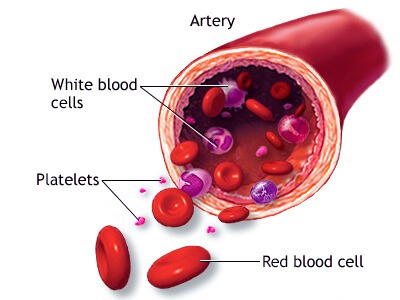Introduction to MCV
MCV, which stands for Mean Corpuscular Volume, is a key metric in blood tests that measures the average volume of red blood cells (RBCs) in your blood. It’s one of the parameters evaluated as part of a Complete Blood Count (CBC), a common blood test that assesses overall health and detects a variety of disorders, including anemia, infections, and many other diseases. The MCV value is calculated by dividing the total volume of red blood cells by their number. This figure is represented in femtoliters (fL). A normal MCV score typically ranges between 80 and 100 fL, but these values can vary slightly depending on the laboratory standards. Understanding MCV is crucial because it helps healthcare professionals diagnose the cause of anemia and other conditions related to the size of red blood cells. For example, a higher MCV value could indicate macrocytic anemia, often due to Vitamin B12 or folate deficiency, while a lower MCV might suggest microcytic anemia, commonly linked to iron deficiency.
What Does MCV Stand For?
MCV stands for Mean Corpuscular Volume. It is a measure of the average size of your red blood cells, which is crucial for diagnosing and monitoring conditions related to blood health, including various types of anemia. MCV is typically assessed through a blood test as part of a complete blood count (CBC).
The Importance of MCV in Blood Tests
MCV, or Mean Corpuscular Volume, is a critical parameter measured in blood tests that indicates the average size of red blood cells (RBCs) in a blood sample. This measurement is vital for diagnosing and monitoring conditions that affect red blood cell size, which can provide insights into various types of anemia and other health conditions. A high MCV might indicate macrocytic anemia, where red blood cells are larger than normal, often due to Vitamin B12 or folate deficiency. Conversely, a low MCV could suggest microcytic anemia, where red blood cells are smaller than normal, often seen in iron deficiency anemia or chronic diseases. Understanding MCV levels helps in pinpointing the underlying cause of anemia and guides appropriate treatment strategies, highlighting its importance in clinical diagnostics and patient care.
Understanding Blood Tests
The Components of a Complete Blood Count (CBC)

A Complete Blood Count (CBC) is a fundamental blood test that evaluates overall health and detects a wide range of disorders, including anemia, infection, and leukemia. A CBC measures several components of your blood, including:
- Red Blood Cells (RBCs): Vital for carrying oxygen throughout the body.
- White Blood Cells (WBCs): Part of the immune system and fight infection.
- Hemoglobin (Hb): The protein in RBCs that carries oxygen.
- Hematocrit (Hct): The proportion of RBCs in your blood.
- Mean Corpuscular Volume (MCV): Measures the average size of your RBCs. It is important for diagnosing the type of anemia.
- Mean Corpuscular Hemoglobin (MCH): The average amount of hemoglobin per red blood cell.
- Mean Corpuscular Hemoglobin Concentration (MCHC): The average concentration of hemoglobin in RBCs.
- Red Cell Distribution Width (RDW): Measures the variation in the size of RBCs.
- Platelets: Small blood components that help in clotting.
Each of these components can provide crucial information about a person’s health, indicating the presence of diseases, conditions, or potential health risks.
How Is a Blood Test Performed?
Performing a blood test typically involves the following steps:
- Preparation: Depending on the type of blood test, you may need to fast (not eat or drink anything except water) for a certain period before the test. Your doctor will inform you about any specific instructions.
- Venipuncture: The most common method for drawing blood is venipuncture. A healthcare professional will clean the skin over a vein, usually in your arm, and then insert a small needle to draw blood. This process is generally quick and might cause a brief sting.
- Collecting the Blood: The blood collects into a vial or syringe attached to the needle. The amount of blood needed depends on the tests being performed.
- Aftercare: Once enough blood has been collected, the needle is removed, and a small bandage is applied to the site to stop any bleeding. You might be asked to apply pressure and keep the arm straight for a few minutes to minimize bruising.
- Analysis: The collected blood samples are sent to a laboratory for analysis. The specific tests performed will vary based on the reason for the blood test.
- Results: Results may take anywhere from a few hours to a few days to become available, depending on the complexity of the tests. Your healthcare provider will discuss the results with you.
Deep Dive into MCV
What Does MCV Measure?
MCV, or Mean Corpuscular Volume, measures the average size of your red blood cells (RBCs). It’s a crucial component of a Complete Blood Count (CBC) and helps in evaluating and diagnosing different types of anemia and other conditions related to the size of red blood cells. MCV is calculated by dividing the total volume of red blood cells (hematocrit) by the number of red blood cells in a given volume of blood, and the result is expressed in femtoliters (fL). A higher MCV indicates larger red blood cells, while a lower MCV suggests smaller red blood cells. This information can be used to guide further testing and treatment decisions.
Normal MCV Levels
Mean Corpuscular Volume (MCV) is a measurement that reflects the average size of red blood cells in a blood sample. Normal MCV levels typically range from 80 to 100 femtoliters (fL). These values are part of the standard complete blood count (CBC) and can help in diagnosing various conditions, including types of anemia. An MCV below the normal range suggests microcytic anemia, often related to iron deficiency, while an MCV above the normal range indicates macrocytic anemia, which can be caused by a deficiency in vitamin B12 or folate.
Factors That Influence MCV Levels
Mean Corpuscular Volume (MCV) levels can be influenced by a variety of factors, including the type of anemia, risk of cardiovascular events, and excessive alcohol use. Elevated MCV, known as macrocytosis, can indicate conditions such as vitamin deficiencies (B12 or folate), liver disease, and excessive alcohol consumption. Decreased MCV, indicating microcytosis, often points to iron deficiency anemia. Other less common causes of high MCV include certain cancers like colorectal, esophageal, and liver cancers. It’s important to note that while MCV is a critical value in the complete blood count (CBC) for determining the type of anemia, it is not the only value used for diagnosis.
High MCV Levels: What Do They Mean?
Potential Causes of High MCV
High Mean Corpuscular Volume (MCV) indicates enlarged red blood cells, a condition known as macrocytosis. Several potential causes for high MCV include:
- Pernicious Anemia: This is a type of anemia caused by vitamin B12 deficiency due to poor absorption.
- Vitamin B12 Deficiency: Apart from pernicious anemia, other causes can lead to a deficiency in vitamin B12, affecting red blood cell size.
- Folate Deficiency: Like vitamin B12, folate is crucial for proper red blood cell formation. Deficiency can result in enlarged red blood cells.
- Liver Disease: Liver issues can impact red blood cell size, leading to higher MCV values.
- Blood Disorders: Various blood disorders, including certain types of anemia, might result in an increased MCV.
Symptoms of macrocytosis might not always be evident and can be detected through a CBC (Complete Blood Count) test.
Symptoms and Warning Signs
When someone has a high Mean Corpuscular Volume (MCV), indicating macrocytosis or anemia with high MCV, they might experience a range of symptoms, including:
- Fatigue: A common symptom associated with anemia and high MCV levels, leading to a general feeling of tiredness or weakness.
- Shortness of Breath: This can occur with mild activity or even at rest, reflecting the body’s struggle to meet its oxygen demands.
- Mouth Ulcers and Sore or Unusually Red Tongue: These symptoms can indicate nutritional deficiencies often associated with macrocytosis.
- Dizziness or Lightheadedness: Particularly noticeable when standing up, this can be a sign of anemia-related low blood pressure.
These symptoms are typically indicative of underlying conditions that cause high MCV, such as vitamin deficiencies, liver disease, or hypothyroidism. It’s important to consult a healthcare provider for an accurate diagnosis and appropriate treatment.
Low MCV Levels: Unpacking the Causes
Potential Causes of Low MCV
A low Mean Corpuscular Volume (MCV) indicates that red blood cells are smaller than normal, often pointing toward various types of anemia. Key causes include:
- Iron Deficiency Anemia: The most common cause, resulting from a lack of iron, which is essential for hemoglobin production.
- Thalassemias: A group of inherited blood disorders that affect hemoglobin production and lead to microcytosis.
- Lead Poisoning: Exposure to lead, often from the environment or certain occupations, can affect hemoglobin synthesis and reduce MCV.
These conditions can impact the body’s ability to transport oxygen efficiently, leading to symptoms such as fatigue, weakness, and shortness of breath. Diagnosis and treatment typically involve blood tests, lifestyle adjustments, and addressing the underlying causes.
Symptoms and Warning Signs
Variations in Mean Corpuscular Volume (MCV) can manifest in symptoms that range from none to specific, depending on the underlying condition. For high MCV (macrocytosis), individuals may not experience any symptoms, but when they do, it’s usually due to the types of anemia associated with enlarged red blood cells. For low MCV (microcytosis), signs include symptoms of iron-deficiency anemia. Common symptoms associated with abnormal MCV values, regardless of being high or low, may include:
- Feeling weak or unusually tired
- Numbness and tingling in the hands and feet
- Loss of appetite and irritability
- Shortness of breath
- Fatigue and headache
- Dizziness and arrhythmias
These symptoms can indicate the need for further evaluation and a comprehensive blood test to determine the MCV levels and identify possible causes.
The Role of MCV in Diagnosing Health Conditions
Anemia and MCV
Mean Corpuscular Volume (MCV) plays a crucial role in diagnosing and managing various health conditions, particularly anemia. MCV measures the average size of red blood cells (RBCs) and helps in classifying anemia based on red cell morphology. Anemia, a common blood disorder, is characterized by a deficiency in the number or quality of red blood cells. MCV levels are instrumental in distinguishing between different types of anemia: microcytic, normocytic, and macrocytic, each indicative of various underlying causes such as iron deficiency, liver disease, or vitamin deficiencies. By assessing MCV alongside other blood test results, healthcare providers can better determine the presence of anemia, its type, and potential causes, thereby guiding appropriate treatment strategies.
Beyond Anemia: Other Conditions
While the Mean Corpuscular Volume (MCV) test is widely recognized for its role in diagnosing various forms of anemia, it also serves as a crucial diagnostic tool for identifying and managing other health conditions. Beyond anemia, variations in MCV can indicate liver disease, vitamin deficiencies, and can aid in the assessment of marrow production issues. A high MCV, for instance, might point towards liver disease or vitamin B12 deficiency, whereas a low MCV could hint at iron deficiency or thalassemia. Therefore, the MCV test, by measuring the average size and volume of red blood cells, provides essential insights not just into anemia but into a broader spectrum of medical conditions, helping guide further diagnostic testing and treatment planning.
Managing Abnormal MCV Levels
When to See a Doctor
Seeking medical advice is crucial if you encounter abnormal Mean Corpuscular Volume (MCV) levels, as these can indicate various health conditions. Here’s when you should contact a doctor:
- Elevated MCV Levels (Macrocytosis): If a Complete Blood Count (CBC) test shows high MCV values, indicating enlarged red blood cells, it’s essential to consult a healthcare provider. Macrocytosis can occur without symptoms, so a doctor’s evaluation is necessary to determine the underlying cause.
- Low MCV Levels: Similarly, if your MCV levels are lower than the normal range, it could be a sign of conditions like iron deficiency or thalassemia. A healthcare professional can provide a proper diagnosis and treatment plan.
- Other Symptoms: If abnormal MCV levels accompany symptoms like fatigue, weakness, unusual bruising, or pallor, it’s important to seek medical attention. These symptoms, combined with abnormal MCV levels, could point to more serious health issues that require medical intervention.
Always remember, that interpreting MCV levels and their implications should be done by a healthcare provider, who can offer guidance, further diagnostic testing, and appropriate treatment options.
Treatment Options
Managing abnormal Mean Corpuscular Volume (MCV) levels involves addressing the underlying causes. Treatment options include:
- Nutritional Adjustments: For deficiencies leading to abnormal MCV levels, dietary changes or supplementation may be necessary. Vitamin B12 and folate supplements are common for macrocytosis due to nutritional deficiencies.
- Medication Review: Some medications can affect MCV levels. If a medication is the cause, your healthcare provider might adjust your prescription or suggest an alternative treatment.
- Lifestyle Modifications: Lowering MCV levels might require lifestyle changes, such as reducing or eliminating alcohol intake, as alcohol can significantly impact MCV values.
- Monitoring and Regular Check-ups: Some conditions reflected by abnormal MCV levels may require ongoing management rather than a one-time treatment. Regular check-ups help monitor the condition and adjust treatments as necessary.
It’s essential to work closely with a healthcare provider to determine the specific cause of abnormal MCV levels and to develop an appropriate treatment plan.
Conclusion
Understanding what MCV in blood tests means can empower you to take charge of your health. This tiny measure can reflect significant aspects of your well-being, making it a key indicator to watch and understand in the context of your overall health.
Read also: What Causes Ear Infections
FAQs
Q. Can diet affect my MCV levels?
Yes, diet plays a crucial role. For instance, a deficiency in Vitamin B12 or folate can lead to increased MCV levels.
Q. Are abnormal MCV levels always a cause for concern?
Not always. Slight deviations might not indicate a serious issue, but it’s essential to consult with a healthcare provider for a proper assessment.
Q. How often should MCV levels be checked?
This depends on your overall health and any underlying conditions. Your doctor can provide personalized advice based on your health history.
Q. Can dehydration affect MCV levels?
Yes, dehydration can temporarily alter the concentration of red blood cells, potentially affecting MCV levels.
Q. Is it possible to have normal MCV levels and still have health issues?
Absolutely. MCV is just one indicator of health. Comprehensive health assessments consider various tests and factors.




